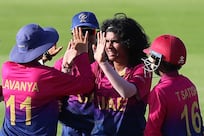DUBAI // Thousands of young girls in Malawi will be handed an education lifeline thanks to a Dh1.8 million Dubai Cares grant funding a programme to encourage more pupils to stay in school.
A new partnership between the UAE charity and the Malawi-based Creative Centre for Community Mobilisation will benefit 11,000 students in the Thyolo district.
The scheme was announced on Tuesday to mark the United Nations International Day of the Girl Child.
The Dh1,836,750 grant will go towards improving learning facilities in the area by increasing the number of qualified teachers, classrooms and educational materials currently available.
It is hoped the investment will encourage change from the current tradition of young girls dropping out of school to get married and start a family.
According to Unesco, just 57 per cent of girls in Malawi complete primary school education.
On a visit to Malawi – where the partnership is being launched – Tariq Al Gurg, chief executive of Dubai Cares, said the project’s main objective was to address gender-related discrimination in education in the south of the country.
“Through this programme, we hope to assist the government of Malawi, which has made enormous strides in improving the lives and education of the country’s young boys and girls,” he said.
“We hope to achieve this in partnership with CRECCOM, who will take on the task of designing and implementing cost-effective and sustainable solutions to improve girls’ chances at accessing quality education and learning.”
Dubai Cares has been working in Malawi for more than a year to get its latest educational project in the developing world up and running.
In a country where the average salary is US$50 (Dh184) a month and 85 per cent of the population live in poverty, education spending is tight.
Charity staff have been visiting Malawi for more than a year and working with the Ministry of Education to research existing schools and designing programmes that best suit the country’s needs.
“This approaches girls’ education in a holistic way,” said Malawi programme officer Nada Al Hajjri.
“It provides support not only to the girls, but also to their families, communities, schools and teachers to ensure girls are enveloped in an enabling environment.
“The project improves the likelihood of girls going to school, staying in school and learning.”
Despite increasing numbers of children being granted access to free basic education, deep challenges remain for those going on to study in post-primary education.
The partnership with CRECCOM will help to put new learning opportunities in the hands of children at 100 primary schools in Thyolo, and 12 community day schools – representing 60 per cent of schools in the region.
If successful, Dubai Cares intends to expand the two-year programme beyond the 1,200 surrounding villages with the help of other NGOs in the country.
Since the early 1990s, the Malawian government has improved access to education for children through policy change, free primary education and the abolishment of school uniforms to help cut costs for parents.
Overseas investment, such as the funding from Dubai Cares, remains crucial in maintaining that progress.
“Children should be given the same opportunities in life, including the right to quality education in safe learning environments,” Mr Al Gurg said.
“Through this programme, we aim to secure a platform for girls to break through the hurdles of gender norms and achieve professional and personal success equivalent to their male counterparts.”
nwebster@thenational.ae






